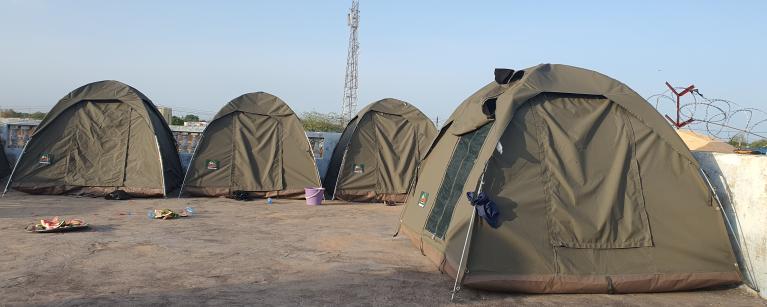As the fighting in Sudan escalates, more people are fleeing across the border to South Sudan, where the situation remains dire and set to get much worse. Our team have just returned from the border town of Renk, where returning South Sudanese and Sudanese people find themselves stranded without shelter or basic services, even as the rainy season begins in force.
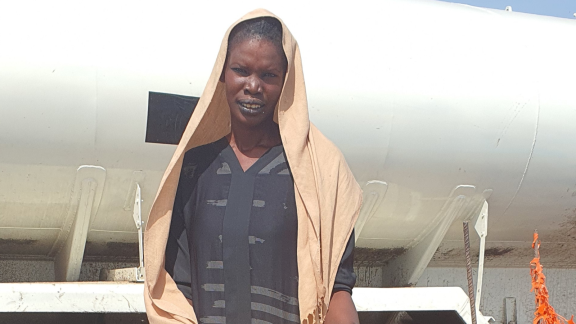
Angelica, the midwife who delivers women in the open in South Sudan. Photo credit: Dominic Kango/ Oxfam
Angelica: The midwife who delivers women in the open
While in Khartoum, Angelica used to deliver women in a good hospital but now she finds herself doing a voluntary job with no supplies and equipment used for delivering children. Every woman deserves the right to privacy and dignified delivery but in a camp located at the border town of Renk camp, refugees and returnees lack basic services such as health centres to deliver a baby, water, and soap to aid the delivery process. Read her story:
“We need water and basic supplies to deliver women, we need wheat to feed the pregnant women and create a safe room for women to deliver. We don’t have soaps. How do you feel when you see children delivered outside and, in the rain, because there is no delivery room? There are many pregnant women coming from all over and as far as Khartoum. Oxfam is providing water, but it is not enough because many people including pregnant mothers come here every day and we don’t have enough to help them.”
“Oxfam is providing water, but it is not enough because many people including pregnant mothers come here every day and we don’t have enough to help them.”
“We need water and basic supplies to deliver women, we need wheat to feed the pregnant women and create a safe room for women to deliver. We don’t have soaps. How do you feel when you see children delivered outside and, in the rain, because there is no delivery room ?There are many pregnant women coming from Khartoum. Oxfam is providing water, but it is not enough because many people including pregnant mothers come here every day and we don’t have enough to help them."
Awadia Chol Deng :The restaurant owner who lost it all
Living in Khatoum, Awadia used to own a restaurant with seven employees. She is in Zero, a transit center hardly recognised by the Aid agencies because of unclear information on who opened it. However, because of the growing number of people entering South Sudan, Oxfam, MSF and NRC are responding by providing drinking water, WASH NFI, Hygiene promotion and construction of latrines. She spoke to us on the world refugee day.
“We live in Zero refugee transit centre, but the problem is there is no market to sell food. There is no way someone can drink water without eating food.”
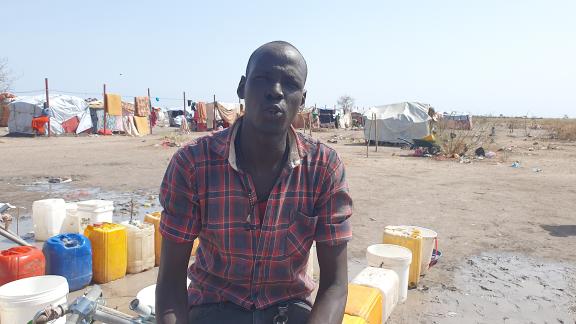
Mathiang, the father who struggling to support his family in South Sudan. Photo credit: Dominic Kango/ Oxfam
Mathiang : The father who is struggling to support his family
Most families have been separated at the onset of the fighting in Sudan either by choice or circumstances beyond their reach. Mathiang, refugee in Renk, South Sudan border had two options to stay behind in Sudan and protect their home in Haj Yusif or to flee the war with his family to South Sudan. After days of travelling, Mathiang arrived in Renk. Here, his ability to provide for his starving family is limited. At the transit center, there is no work he could do that would enable Mathiang to provide for his family and he now relies on NGO’s to be able to help his family.
Read his plea for help : “There is no water, food, and work. Before we came here, we searched for places to stay but we were unable to get somewhere with my family. As a father, I’m torn, and I don’t know where I can take my family. There are little children, but where do you lay them down to sleep? There is no sheet, no roof, no mosquito net, and no bed. As an adult you sleep on the ground but how about the children? We depend on God for daily survival.”
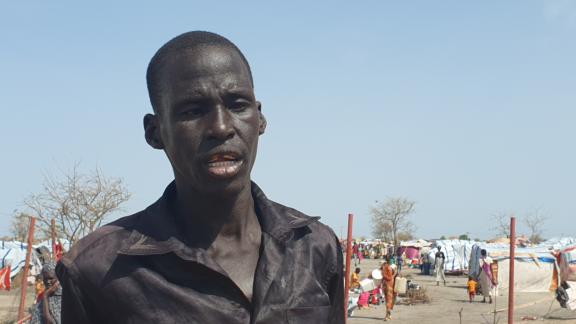
Chol Yong, the Security Officer who knows what he wants. Photo credit: Dominic Kango/ Oxfam
Chol Yong : The Security Officer who knows what he wants
Chol, a former officer arrived in the transit centre and self-appointed himself as a security officer helping in crowd management. He sees everything that happens in the transit center and is he is very much informed about the problems the community is facing. He explicitly outlined the needs of the community in the transit center:
“People of Juba, there is no water, shelter, and poles for erecting structures. Secondly, we need medicine. Thirdly, we need space to live and settle."
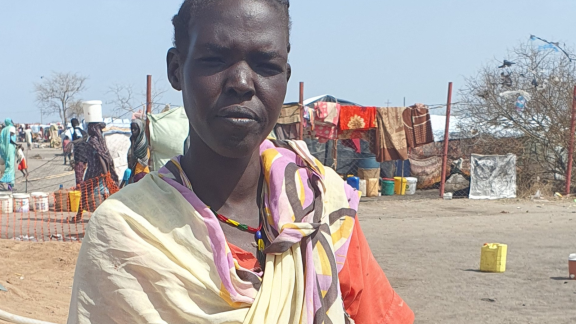
Angeline Mading, the businesswoman who wants to do business in the camps. Photo credit: Dominic Kango/ Oxfam
Angeline Mading : The businesswoman who wants to do business in the camps
Angeline used to sell foodstuff in a small shop in Khartoum and managed to escape with some of her goods to Renk with the hope of continuing the business. Unfortunately, she was forced to consume the food and share it with the people around her as there was nothing forthcoming for them. She is now stranded, not knowing where to start but hopeful that she can start over again if she gets capital.
“We don’t have a place to live. There is not enough water or even food. We hope that NGOs and governments are thinking about us. The government has not come to us here, only the aid workers have arrived and offered something small, but it is not enough. I used to work daily in Khartoum and make money but here, where do I start? No one has a penny to buy anything. I even used up everything that I was selling."
“I used to work daily in Khartoum and make money but here, where do I start ?”
